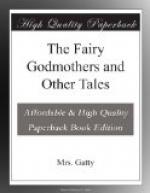Looking down, he perceived that a sickly, hungry-looking child was stretched across the road asleep, and that by its side sat a woman, the picture of misery and want. Theodore felt a strong sensation of compassion seize him as he gazed at the child, and he stooped and lifted it from the ground.
The woman observed Theodore’s eye, and said, “Ay, without help we shall neither of us be here long!”
“I will help you,” said Theodore, “tell me what I can do!”
“What can you or any one do, for a dying woman and a half-starved child?” groaned the poor creature. “Food, food! medicine and help!” These words burst from her in broken accents—I am dying!”
“Are you so very ill?” asked Theodore, turning deadly pale; and he murmured to himself—“Death again! I dare not see it again so soon! Here!” continued he, thrusting gold into her hand, “now you see that I will help you! Look, I will send you food, and you shall be brought to the house: but let me take the child, he cannot do you good, and I will see to him.” “He must not see her die;” was Theodore’s inward thought.
“Ay, take him,” muttered the woman gloomily, “and send me cordials. No one wants to go even an hour before their time!”
Theodore obeyed almost mechanically, and lifting up the little boy, he made a shift to carry him to the house. On arriving there, he called for his housekeeper and desired her to take food and wine to the woman he had left, and to bring her to the house. Then he sent another servant for a doctor, and afterwards undertook himself the care of the forlorn child. He placed him on a sofa in his study and sat down by him.
“Are you ill?” was his first question.
“I don’t know,” was the answer.
“Are you hungry?”
“Very!”
Here Theodore got up and went to the next room, where preparations were being made for dinner, and fetched bread and gave it to the boy, who ate it greedily, without once lifting up his eyes. “Poor child,” thought Theodore, “life has no mental troubles for him!”
“Are you sorry your mother is so ill?” was his next inquiry.
“She’s not my mother,” muttered the boy.
Theodore started—“What do you mean? Are you not that woman’s child?”
“No! She told me I wasn’t.”
“Who are you, then?”
“I don’t know. She told me she had stolen me to beg for her.”
“And do you remember nothing about it?”
“No, its too long ago.”
Theodore now fetched him more bread, but whilst he was eating it he no longer sat by him, but walked up and down the room. Every now and then as he stopped and looked at the thin, sickly looking object he had brought into the house, he was overtaken by a strong feeling of pity for his miserable condition.
This child was as desolate as himself, only in another way. Stolen from his parents to beg for the strange woman, he had lived with her so long that he had forgotten his real home altogether! Bound by no ties of kindred and comfort to this world. “He is more desolate than I am myself!” repeated Theodore, again and again.




